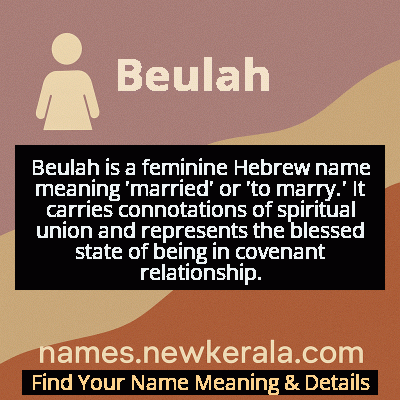Beulah Name Meaning & Details
Origin, Popularity, Numerology Analysis & Name Meaning of Beulah
Discover the origin, meaning, and cultural significance of the name BEULAH. Delve into its historical roots and explore the lasting impact it has had on communities and traditions.
Name
Beulah
Gender
Female
Origin
Hebrew
Lucky Number
4
Meaning of the Name - Beulah
Beulah is a feminine Hebrew name meaning 'married' or 'to marry.' It carries connotations of spiritual union and represents the blessed state of being in covenant relationship.
Beulah - Complete Numerology Analysis
Your Numerology Number
Based on Pythagorean Numerology System
Ruling Planet
Uranus (Rahu)
Positive Nature
Strong sense of order, loyal, practical, and disciplined.
Negative Traits
Stubborn, overly serious, rigid, and prone to feeling restricted.
Lucky Colours
Blue, gray.
Lucky Days
Saturday.
Lucky Stones
Blue sapphire.
Harmony Numbers
1, 7, 8.
Best Suited Professions
Managers, engineers, accountants, organizers.
What People Like About You
Dependability, discipline, practicality.
Famous People Named Beulah
Beulah Bondi
Actress
Academy Award-nominated for her supporting roles in multiple films spanning five decades
Beulah Louise Henry
Inventor
Held 49 patents and created over 100 inventions, revolutionizing multiple industries
Beulah Ream Allen
Military Officer
Pioneering female colonel who broke gender barriers in US military education
Beulah Mae Donald
Civil Rights Activist
Won landmark lawsuit against KKK that set precedent for civil rights accountability
Name Variations & International Equivalents
Click on blue names to explore their detailed meanings. Gray names with will be available soon.
Cultural & Historical Significance
Extended Personality Analysis
Individuals named Beulah are often perceived as nurturing, loyal, and deeply connected to tradition and family values. They typically exhibit strong maternal instincts and a natural inclination toward caregiving, making them excellent friends and family members who provide emotional stability and support. Their name's meaning of 'married' often translates into personality traits of commitment, reliability, and dedication in all relationships. Beulahs tend to be practical yet romantic, balancing earthly responsibilities with spiritual depth. They often possess quiet strength and resilience, drawing from the name's biblical heritage of redemption and covenant. While sometimes reserved or traditional in their outlook, they demonstrate remarkable inner fortitude when facing challenges. Their combination of domestic warmth and spiritual grounding makes them pillars in their communities, often serving as keepers of family history and cultural traditions. These personality characteristics reflect the name's dual nature—both earthly and spiritual—creating individuals who bridge the practical and mystical aspects of life with grace and determination.
Modern Usage & Popularity
In contemporary times, Beulah has become quite rare, ranking outside the top 1000 baby names in the United States since the 1960s. However, it has seen a modest revival among parents seeking vintage, biblically-rooted names with historical depth. The name appeals particularly to those interested in Puritan-era names or seeking alternatives to more common biblical names. Modern usage often occurs in religious communities, especially among evangelical Christians and those with appreciation for Old Testament names. While still uncommon, Beulah fits current naming trends favoring antique revivals and meaningful heritage names. Its decline in the mid-20th century was likely due to its association with the stereotypical 'mammy' character from the Beulah show, but recent generations have begun reclaiming the name for its authentic biblical and historical significance, seeing it as a strong, meaningful choice that stands out from more popular biblical names.
Symbolic & Spiritual Meanings
Symbolically, Beulah represents the concept of sacred union and spiritual marriage on multiple levels. It embodies the covenant relationship between God and humanity, the mystical marriage of Christ and the Church, and the ideal of earthly marriage as a reflection of divine love. The name carries connotations of promised land, spiritual fulfillment, and redemption—the transformation from desolation to blessedness. In broader symbolic terms, Beulah signifies the union of opposites: heaven and earth, spirit and matter, divine and human. It represents the fertile ground where spiritual aspirations take root in daily life, making the ordinary sacred. The name also symbolizes homecoming and belonging, evoking the sense of arriving at one's true spiritual home after journeying through life's challenges. This rich symbolic tapestry makes Beulah not just a personal name but a conceptual framework for understanding relationships, spirituality, and the intersection of human and divine love.

